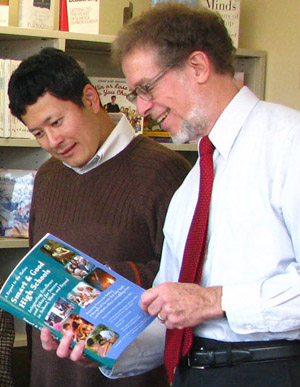Bulletin News

11/08/2011
Five Japanese professors visited SUNY Cortland on Nov. 7 to learn how to bring character education into their country’s classrooms.
Two faculty members from Hiroshima University, two from Okayama University and one from Doshisha University held all-day meetings with psychologist Thomas Lickona, a professor of childhood/early childhood education at the College. Lickona directs the School of Education’s Center for the 4th & 5th Rs (Respect and Responsibility), a character education center devoted to advancing the “smart and good” schools vision throughout schools in this country and abroad.
“There is, in fact, a growing international character education movement,” said Lickona. For example, last year the center hosted Ryota Yaginuma, an associate professor at Gifu National University’s Graduate School of Education, for one full year of study at the College. SUNY Cortland’s James M. Clark Center for International Education assisted with that academic guest scholar’s appointment. Yaginuma ultimately plans to write a book for Japanese teachers on how character education is implemented in 24 award-winning American high schools.
So what would American educators have to share with Asian cultures about class control and high academic performance in the classroom?
“The problems they have really cut across cultures,” said Lickona, a published author of eight books on character development and moral behavior.
“They have bullying in schools,” Lickona said. “It takes different forms, but meanness and exclusion and harassment are found there. Some Japanese children have killed themselves because of bullying in the classroom.”
“Cheating is a problem in Japan as it is in our schools,” added Lickona. His center’s Smart and Good Schools Summer Institutes have trained more than 4,500 principals, teachers and other educators from 35 U.S. states and 20 countries. “It just gets worse as it goes up the grades. It’s most severe in the high schools where the competition to get the best grades is the strongest.”
SUNY Cortland’s five visitors were:
• Tazuko Aoki, a professor in the Faculty of Learning Science at the Graduate School of Education at Hiroshima University in Hiroshima, Japan, who is group leader for this research project.
• Yoshimasa Hashigaya, a professor in art education at the Graduate School of Education at Okayama University, who would like to bring his research to bear on teaching communication design.
• Shigeyuki Atarashi, a professor in the Department of Philosophy at Doshisha University in Kyoto, Japan, who is studying pragmatic ethics.
• Tsuyoshi Yamada, an associate professor in the Graduate School of Education at Okayama University, who is interested in measuring results in character education.
• Norimune Kawai, an associate professor in the Center for Special Needs Education Research and Practice at Hiroshima University, who will research speech disorders and character education in special needs classrooms.
After spending a day with the guests, Lickona arranged for them to visit the Shipley School in Bryn Mawr, Pa., and observe the school’s model kindergarten through fifth grade classrooms.
“Usha Balamore, Shipley School’s director of character education and assistant head of its lower school, has developed an exemplary, school-wide character education program,” said Lickona, noting that Balamore is a native of India.
He said the school has based its character education program on Lickona’s and Matthew Davidson’s 2005 report, “Smart and Good High Schools: Integrating Excellence and Ethics for Success in School, Work, and Beyond.”
 |
| Five character education project members from Japan met with Thomas Lickona, shown on the right, Nov. 7 at SUNY Cortland’s Center for the 4th and 5th Rs. They are, from the left: Yoshimasa Hashigaya, Tsuyoshi Yamada, Tazuko Aoki, Shigeyuki Atarashi and Norimune Kawai. |
The Shipley School used the Smart and Good Schools framework to design age-appropriate activities to help their students develop performance character, which is needed to do their best work, and moral character, which is needed to be their best selves, within an ethical learning community. This approach, effectively in use in the lower grades, has now expanded into Shipley’s Middle School.
The Japanese visitors expressed an eagerness to take their findings back to Japan.
Aoki, whose academic field is developmental psychology, is interested in the positive development of youth in global society. She became familiar with character education in Kansas City, Kansas, when her family stayed there in 1998. Back in Japan, she began to conduct the research with some school district participants.
“This time, I would like to know how to make an effective comprehensive approach in school,” she said. “For example, creating a caring school community and providing students with opportunities for moral action across grade levels in the USA.”
Hashigaya’s major is design, especially visual communication design emphasizing typography.
“In this research trip, I want to know how to use the visual communication design for students and staffs in the practices of effective character education,” Hashigaya said.
Atarashi, who has translated texts on moral education into Japanese, described his philosophical research objective:
“I would like to focus on the ethical aspects of children fostering their own good habits in the practices of character education,” he said.
Yamada, an educational psychologist, is very interested in the evaluation of character education.
“I want to know how to verify the effects of character education,” he said.
The center is located in Cornish Hall, Room 1307. For more information, call (607) 753-2455 or e-mail character@cortland.edu.

